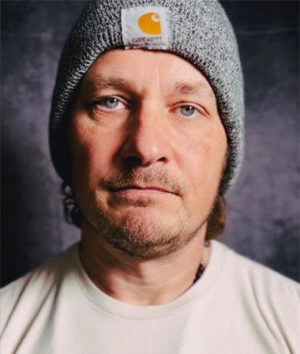Robert Sweetman

Robert joined the Navy at 28 years old to become a Navy SEAL. By 29, he completed BUDs class 284, where he sustained a quadruple hernia requiring surgery. He served for eight years where he did two deployments with SEAL Team Seven and became an instructor at Advanced Training Command. He was medically retired after a back injury but had multiple other “”hidden”” injuries. Those included Post-Traumatic Stress Disorder (PTSD), Traumatic Brain Injury (TBI), Obstructive Sleep Apnea and Insomnia. Robert tells the story of using Ambien to go to sleep and stimulants to wake up. At one point in time he was using NyQuil to go to sleep at night.
Then, on April 23rd, 2017, one of Robert’s platoon mates, Ryan Larkin, took his own life. Ryan had been struggling with sleep for a long time along with PTSD and TBI. Robert was impacted by Ryan’s death and took it upon himself to better understand why this happened. Ryan’s father Frank launched research on TBI while Robert dove into sleep science. After years of research, Robert discovered the bi-directional relationship between sleep and mental health. Poor sleep can cause mental health conditions to include suicidality. Robert dedicated his life to the study of sleep science to help all people, especially veterans. Four years later, he founded Sixty Two Romeo.
Robert’s research surrounded the impact of light, sound and temperature on the neurological function of sleep. This became one of the pillars of Sixty Two Romeo. He quickly realized that most people did not understand how sleep works, so he created the second pillar, sleep education. Then he noticed the most common problem with sleep was anxiety before bed, so he found the best relaxation coaches in the world and added the third pillar, relaxation techniques. Finally, Robert discovered that the psychology of sleep had an incredible impact on sleep, so he added techniques from Cognitive Behavioral Therapy for Insomnia (CBTi) as a fourth pillar. These four pillars made the foundation for the Sixty Two Romeo program and are responsible for the incredible success it has achieved.
- Health and Wellness
- Sleep
- PTSD
- Military
- Optimal Performance
Using Sleep as a superpower for work. Cognitive function is directly correlated to the quantity and quality of your sleep! Getting better sleep allows you to perform better at work and in relationships. Sleep deprivation can feel like it gives you more time in the day but it actually decreases the efficiency of all waking hours in that day.
Optimal human performance at the elite athlete level. When you are training for an athletic event, hormonal function and muscle recovery are key. Getting high performance sleep in combination with adequate hydration and proper nutrition are the key to fully recovering, making gains and competing at the top level.
How do light, sound and temperature impact the neurological function of sleep? In a technologically noisy world, we must protect ourselves from the impact of artificial light at night, noise pollution and regulated temperatures. The effect of our environment can be detected in bloodwork and brainwave measurements during sleep.
The Men Talking Mindfulness Podcast
How to Sleep Better and Why It’s So Important! w/ Navy SEAL Turned Sleep Scientist, Rob Sweetman
DTD PODCAST
Robert Sweetman “Navy SEAL/Exist Tribe”
Street Cop Training
Episode 694: A Stoic Approach to Sleep with Rob Sweetman
Transition Drill Podcast
Navy SEAL Veteran | Today 62 ROMEO The Impact of Sleep Deprivation on Mental Health. Robert Sweetman
Talk4 Podcast Episode #071
Rob Sweetman | EX Navy Seal turned Sleep Scientist – Sleep Genius
The Power of Our Story
Robert Sweetman -Sleep scientist/former SEAL- 62 Romeo
Grablives Podcast
Recent podcast by a student on the impact of Robert’s teaching
Coming Soon!
